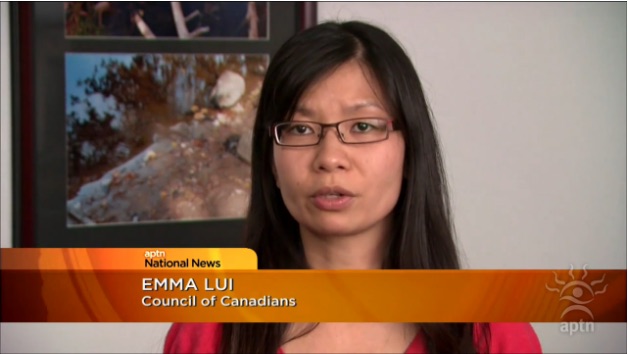The Council of Canadians campaigns to ensure that the human right to water and sanitation is fulfilled for all. We also oppose the privatization of water services. We have long argued that Indigenous peoples in Canada are having their right to water and sanitation violated and that the federal government has an obligation to provide the funding necessary so that they can enjoy these rights.
The situation is serious in terms of access to clean drinking water for First Nations in Canada. APTN reports, “As of March, 135 First Nation communities across Canada were under a boil water advisory. …Of the 23 bands in the East Coast, that operate their own drinking water systems, 21 are considered high risk.”
APTN adds, “Ottawa has touted the $323 million it set aside in its Economic Action Plan in 2014 — money to be spread over two years, for all First Nations in Canada, for water. But it’s a drop in the bucket according to experts who say that is the amount needed to just get Atlantic bands up to par. Nationally, they have pegged it $4.7 billion.” Furthermore, “the federal government passed the Safe Drinking water for First Nations Act in 2013. Regulations are expected within the next year.” But without adequate funding, First Nations will not be able to meet the regulations required in the Act.
So now, “One option that [the Harper] government is looking at is P3s, a public-private partnership. [Simon Osmond, a senior policy analyst with the Atlantic Policy Congress of First Nations] has pitched the idea of a First Nations Water Authority (FNWA) for bands in the Atlantic. The project is called the First Nations Clean Water Initiative [FNWA]. The band would do a temporary surrender the land and assets tied to the water systems to the FNWA. In turn, FNWA — a group of engineers, operators and a First Nations board — would oversee water and wastewater operations for the bands. And under a P3 model, FNWA would sub-lease the land to the private company over a 25-year agreement.”
Council of Canadians water campaigner Emma Lui comments, “P3s in other regions, in other countries, other municipalities, have caused some serious problems in price increases for water. We see a decrease in water quality. The Safe Drinking Water for First Nations Act calls for high standards which is something that we want. But without the appropriate funding, First Nations are in some ways forced to enter into these P3 agreements and later down the road they experience problems with the P3 agreement and want to cancel it the Canadian government could see themselves with a trade challenge or trade lawsuit.”
APTN highlights, “The idea of a First Nations Water Authority hangs in the balance as Aboriginal Affairs will decide on funding at the end of the month. …[And] what happens in the Atlantic could be a template for how the regulations for First Nations’ drinking water roll out across the country.”
The Council of Canadians rejects P3 privatization schemes and has called for the federal government to allocate $4.7 billion over ten years for water and wastewater facilities in First Nations.
Photo: Screenshot from APTN report



